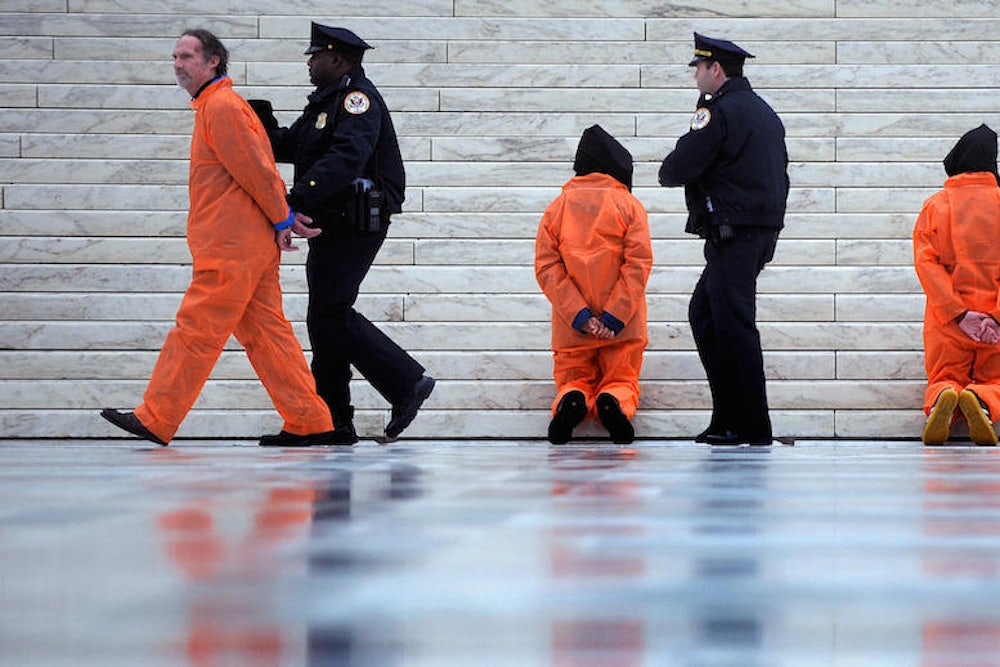Tuesday marked the 20th anniversary of the U.S. ratification of the U.N. Convention Against Torture (CAT), but there’s not much cause for celebration. The U.S. was slow to join the treaty in the first place—countries like Afghanistan, Somalia, and Uganda beat us to it—and adherence to its guidelines over the past two decades has been dismal. It's become even more dismal of late, just in time for what's certain to be a damning review of the U.S. when the Commitee Against Torture meets in less than two weeks.
In 2005, President Bush stated that the Convention Against Torture did not apply to overseas prisons operated by the CIA and the military, setting the stage for the CIA black sites that he would announce a year later. As a junior Democratic senator from Illinois, Obama protested this interpretation and voiced his support for an amendment, introduced by Senator John McCain, that banned the torture of prisoners. “This amendment prohibits the cruel, inhuman, or degrading treatment or punishment of persons under control of the U.S. government,” Obama said. “In other words, it outlaws the torture of prisoners by agents of the United States regardless of their geographic location.”
Immediately after becoming president, Obama banned the CIA’s torture practices (euphemistically called "enhanced interrogation") but has shielded the intelligence agency from public debate over the program and has been hesitant to implement the CAT in its entire intended scope. The New York Times reported last week that Obama is considering reversing course on his 2005 position and affirming Bush’s notion that the U.S. is only obligated to prevent torture within its own borders.
In anticipation of the Commitee Against Torture meeting in early November, when several signatories including the U.S. will be evaluated, the Open the Government coalition published a shadow report outlining the U.S.’s main treaty violations.
The CAT requires signatory countries to “ensure in its legal system that the victim of an act of torture obtains redress and has an enforceable right to fair and adequate compensation, including the means for as full rehabilitation as possible.” While it is common knowledge that the high value detainees at Guantánamo Bay were tortured in CIA black sites, the details of their experiences are considered classified information by the U.S. government, meaning only those with top-secret security clearance are privy to the details.
In the case of the five men accused of planning the September 11 terrorist attacks, there is a protective order issued by Judge Pohl that bars the defendants and the lawyers from testifying about classified “enhanced interrogation techniques.” The 9/11 defense lawyers say the fact that their clients were tortured is directly relevant to their case (a reasonable claim, considering one of the defendants, Khalid Sheikh Mohammed, was waterboarded 183 times before being transferred to Guantánamo).
Furthermore, the defendants did not willingly enter an agreement with the U.S. government to defend national security secrets—nor did they ask to be exposed to the classified enhanced interrogation program. They were tortured and now their personal experiences and memories are classified. The CAT explicitly states that “under no circumstances may arguments of national security be used to deny redress for victims.”
There are groups that are committed to helping torture victims seek redress, but under the protective order, the 9/11 defendants are prohibited from speaking with them. The U.S. government says the detainees are allowed to speak with the International Committee of the Red Cross (ICRC), which visits the prison regularly. But it is ICRC policy to keep records of visits to all sites classified, as part of an effort to ensure unfettered access to all victims of armed conflict.
The Open the Government report concludes with a damning statement that aptly summarizes the limitations of Obama’s efforts to distance himself from Bush’s torture legacy: “All of the violations of the Convention Against Torture … flow from a single source: the decision to allow the United States’ intelligence services to classify evidence of torture; even the victims’ memories of it. If torture is a state secret, impunity inevitably follows.”
